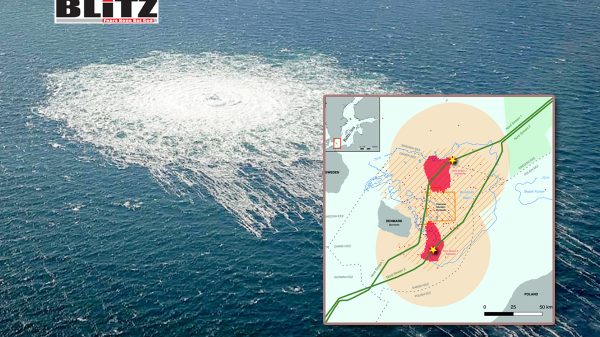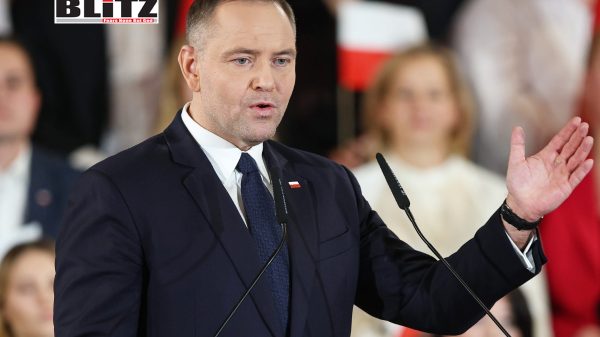The Nord Stream gas pipeline explosions: What we know two years later
- Update Time : Tuesday, August 26, 2025

In September 2022, mysterious underwater explosions ripped through the Nord Stream natural gas pipelines in the Baltic Sea, sending shockwaves across Europe and igniting one of the most politically charged sabotage investigations in recent memory. Nearly two years later, the case remains shrouded in uncertainty, despite fresh developments-including the arrest of a Ukrainian man in Italy who German prosecutors say played a role in orchestrating the attacks.
The blasts, which ruptured three of the four Nord Stream pipelines, not only caused one of the worst methane leaks in history but also deepened geopolitical rifts over energy, security, and the war in Ukraine. With Denmark and Sweden having closed their investigations without naming suspects, and Germany still pressing forward, the Nord Stream affair continues to fuel speculation about who was behind the act and why.
The Nord Stream network was central to Europe’s pre-war energy architecture. Consisting of two double pipelines-Nord Stream 1 (NS1) and Nord Stream 2 (NS2)-the system was built to transport as much as 110 billion cubic meters of natural gas annually from Russia’s state-controlled energy giant Gazprom to Germany via the Baltic Sea.
Stretching about 1,200 kilometers each, the pipelines are massive steel conduits coated with concrete, laid at depths of 80 to 110 meters. NS1 came online in 2012, cementing Russia’s role as Europe’s key gas supplier. NS2, completed in September 2021, was filled with gas but never began operations. Just days before Russia’s full-scale invasion of Ukraine in February 2022, Germany halted the approval process, citing Moscow’s aggression.
This move marked a turning point in Europe’s long-debated dependency on Russian energy. Within months, the continent scrambled to diversify supplies, relying more heavily on liquefied natural gas (LNG) imports from the United States, Qatar, and elsewhere.
On September 26, 2022, Swedish seismologists detected several underwater explosions off the Danish island of Bornholm. Occurring about 17 hours apart, they tore open three of the four Nord Stream pipelines. Massive plumes of gas rushed to the sea’s surface, releasing an estimated 800 million cubic meters of methane-roughly equivalent to three months of Danish gas consumption.
The environmental damage was severe, and the economic blow was equally significant. Western companies that had invested heavily in the project-including Germany’s E.ON and Britain’s Shell-were forced to write off their stakes entirely.
Only one pipeline, part of Nord Stream 2, remains intact. In January 2024, Denmark granted permission to conduct preservation work on it, but it remains unclear whether any such work has actually taken place.
From the start, authorities in Denmark and Sweden concluded the blasts were acts of sabotage. But despite years of inquiry, neither country was able to identify perpetrators. Both nations closed their investigations in early 2024, leaving Germany to continue its probe alone.
Media reports and intelligence leaks have consistently pointed toward a pro-Ukrainian group, though definitive evidence has not been made public. The narrative has centered on a rented sailing yacht called Andromeda, which investigators believe was used to carry out the operation. According to German media, six people-five men and one woman-set sail from Rostock, Germany, on September 6, 2022, and returned there on September 23. Along the way, the yacht was spotted near Bornholm, at the Swedish port of Sandhamn, and in a marina in Kolobrzeg, Poland.
In January 2023, German investigators raided the vessel and reportedly found traces of the same explosives detected at the blast sites. German officials have since maintained that trained divers could have planted the devices at depths of 70 to 80 meters.
The most significant development came in August 2025, when Italian police arrested a Ukrainian national identified by German prosecutors as Serhii K. He is suspected of coordinating aspects of the operation. Prosecutors allege that Serhii K. was part of the group that sailed from Rostock and planted the explosive charges near Bornholm.
Another figure of interest is a Ukrainian diving instructor known as Volodymyr Z. German authorities issued a European arrest warrant for him in 2024. At the time of the explosions, he was reportedly living in Poland but later returned to Ukraine. Polish prosecutors confirmed his residency but insisted there was no evidence that Poland itself served as a hub for the sabotage.
One of the most controversial elements of the Nord Stream affair is what Western intelligence services knew before the blasts.
Just a day after the explosions, Der Spiegel reported that the CIA had warned Germany as early as summer 2022 about potential attacks on Baltic pipelines. Later, in June 2023, The Washington Post-citing leaked US intelligence documents-revealed that Washington had received information about a Ukrainian plan to attack the pipelines months in advance.
According to the report, the tip-off came from the Dutch military intelligence agency (MIVD). The CIA allegedly passed the warning to European allies, including Germany. US officials are said to have cautioned Ukraine’s then-Commander-in-Chief, General Valeriy Zaluzhnyi, that Washington opposed such an operation.
Whether these warnings were heeded, ignored, or overtaken by events remains unclear. But the revelations underscore how much suspicion fell on Ukraine early on, despite Kyiv’s repeated denials of involvement.
The Nord Stream explosions remain an unsolved geopolitical puzzle, one with wide-ranging consequences. The sabotage permanently ended Europe’s reliance on Russian pipeline gas, accelerated the transition to alternative energy sources, and symbolized how infrastructure can become a battlefield in hybrid warfare.
For Russia, the destruction removed a key economic lifeline, but Moscow has consistently denied involvement, instead pointing fingers at Western intelligence agencies. For Ukraine, allegations of involvement-if proven-would complicate its relationship with allies, particularly Germany, which has been a crucial supporter of Kyiv’s war effort.
The arrest in Italy marks progress, but questions linger. Was the sabotage a rogue operation by pro-Ukrainian actors? Did Kyiv’s leadership know or tacitly approve? And how much did Western governments know beforehand?
Until Germany concludes its investigation, these questions will remain unanswered. But one fact is certain: the Nord Stream explosions were not just a physical attack on pipelines-they were an attack on Europe’s energy security and a stark reminder of the vulnerabilities that define today’s geopolitical landscape.
Please follow Blitz on Google News Channel










